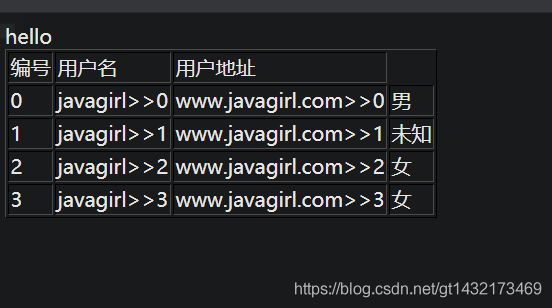springboot整合freemarker
freemarker简介
Freemarker 模版后缀为 .ftl(FreeMarker Template Language)。FTL 是一种简单的、专用的语言,它不是像 Java 那样成熟的编程语言。在模板中,你可以专注于如何展现数据, 而在模板之外可以专注于要展示什么数据。
引入依赖
<dependency>
<groupId>org.springframework.bootgroupId>
<artifactId>spring-boot-starter-freemarkerartifactId>
dependency>
<dependency>
<groupId>org.springframework.bootgroupId>
<artifactId>spring-boot-starter-webartifactId>
dependency>
工程创建完成后,在 org.springframework.boot.autoconfigure.freemarker.FreeMarkerAutoConfiguration 类中,可以看到关于 Freemarker 的自动化配置:
@Configuration
@ConditionalOnClass({
freemarker.template.Configuration.class, FreeMarkerConfigurationFactory.class })
@EnableConfigurationProperties(FreeMarkerProperties.class)
@Import({
FreeMarkerServletWebConfiguration.class, FreeMarkerReactiveWebConfiguration.class,
FreeMarkerNonWebConfiguration.class })
public class FreeMarkerAutoConfiguration {
}
从这里可以看出,当 classpath 下存在 freemarker.template.Configuration 以及 FreeMarkerConfigurationFactory 时,配置才会生效,也就是说当我们引入了 Freemarker 之后,配置就会生效。但是这里的自动化配置只做了模板位置检查,其他配置则是在导入的 FreeMarkerServletWebConfiguration 配置中完成的。那么我们再来看看 FreeMarkerServletWebConfiguration 类,部分源码如下:
@Configuration
@ConditionalOnWebApplication(type = ConditionalOnWebApplication.Type.SERVLET)
@ConditionalOnClass({
Servlet.class, FreeMarkerConfigurer.class })
@AutoConfigureAfter(WebMvcAutoConfiguration.class)
class FreeMarkerServletWebConfiguration extends AbstractFreeMarkerConfiguration {
protected FreeMarkerServletWebConfiguration(FreeMarkerProperties properties) {
super(properties);
}
@Bean
@ConditionalOnMissingBean(FreeMarkerConfig.class)
public FreeMarkerConfigurer freeMarkerConfigurer() {
FreeMarkerConfigurer configurer = new FreeMarkerConfigurer();
applyProperties(configurer);
return configurer;
}
@Bean
@ConditionalOnMissingBean(name = "freeMarkerViewResolver")
@ConditionalOnProperty(name = "spring.freemarker.enabled", matchIfMissing = true)
public FreeMarkerViewResolver freeMarkerViewResolver() {
FreeMarkerViewResolver resolver = new FreeMarkerViewResolver();
getProperties().applyToMvcViewResolver(resolver);
return resolver;
}
}
我们来简单看下这段源码:
1.@ConditionalOnWebApplication 表示当前配置在 web 环境下才会生效。
2.ConditionalOnClass 表示当前配置在存在 Servlet 和 FreeMarkerConfigurer 时才会生效。
3.@AutoConfigureAfter 表示当前自动化配置在 WebMvcAutoConfiguration 之后完成。
4.代码中,主要提供了 FreeMarkerConfigurer 和 FreeMarkerViewResolver。
5.FreeMarkerConfigurer 是 Freemarker 的一些基本配置,例如 templateLoaderPath、defaultEncoding 等
6.FreeMarkerViewResolver 则是视图解析器的基本配置,包含了viewClass、suffix、allowRequestOverride、allowSessionOverride 等属性。
另外还有一点,在这个类的构造方法中,注入了 FreeMarkerProperties:
@ConfigurationProperties(prefix = "spring.freemarker")
public class FreeMarkerProperties extends AbstractTemplateViewResolverProperties {
public static final String DEFAULT_TEMPLATE_LOADER_PATH = "classpath:/templates/";
public static final String DEFAULT_PREFIX = "";
public static final String DEFAULT_SUFFIX = ".ftl";
/**
* Well-known FreeMarker keys which are passed to FreeMarker's Configuration.
*/
private Map<String, String> settings = new HashMap<>();
}
FreeMarkerProperties 中则配置了 Freemarker 的基本信息,例如模板位置在 classpath:/templates/ ,再例如模板后缀为 .ftl,那么这些配置我们以后都可以在 application.properties 中进行修改。
如果我们在 SSM 的 XML 文件中自己配置 Freemarker ,也不过就是配置这些东西。现在,这些配置由 FreeMarkerServletWebConfiguration 帮我们完成了。
Controller层
package com.java.freemarker.controller;
import com.java.freemarker.bean.User;
import org.springframework.stereotype.Controller;
import org.springframework.ui.Model;
import org.springframework.web.bind.annotation.GetMapping;
import org.springframework.web.bind.annotation.RequestMapping;
import java.util.ArrayList;
import java.util.List;
import java.util.Random;
/**
* @author :shawn
* @create :2020-06-22 21:45:00
*/
@Controller
public class UserController {
@GetMapping("/user")
public String user(Model model)
{
List<User> users = new ArrayList<>();
Random random = new Random();
for (int i=0;i<10;i++)
{
User user = new User();
user.setId((long)i);
user.setUsername("javagirl>>"+i);
user.setAddress("www.javagirl.com>>"+i);
user.setGender(random.nextInt(3));//生成随机数
users.add(user);
}
model.addAttribute("users",users);
return "user";
}
}
user.ftl
<html lang="en">
<head>
<meta charset="UTF-8">
<title>title>
head>
<body>
<#include './header.ftl'>
<table border="1">
<tr>
<td>编号td>
<td>用户名td>
<td>用户地址td>
tr>
<#list users as u>
<#if u.id=4>
<#break>
#if>
<tr>
<td>${u.id}td>
<td>${u.username}td>
<td>${u.address}td>
<td>
<#-- <#if u.gender==1>
男
<#elseif u.gender==0>
女
<#else>
未知
#if>-->
<#switch u.gender>
<#case 0>男<#break>
<#case 1>女<#break>
<#default>未知
#switch>
td>
tr>
#list>
table>
body>
html>
运行结果

其他配置
如果我们要修改模版文件位置等,可以在 application.properties 中进行配置:
spring.freemarker.allow-request-override=false
spring.freemarker.allow-session-override=false
spring.freemarker.cache=false
spring.freemarker.charset=UTF-8
spring.freemarker.check-template-location=true
spring.freemarker.content-type=text/html
spring.freemarker.expose-request-attributes=false
spring.freemarker.expose-session-attributes=false
spring.freemarker.suffix=.ftl
spring.freemarker.template-loader-path=classpath:/templates/
配置文件按照顺序依次解释如下:
1.HttpServletRequest的属性是否可以覆盖controller中model的同名项
2.HttpSession的属性是否可以覆盖controller中model的同名项
3.是否开启缓存
4.模板文件编码
5.是否检查模板位置
6.Content-Type的值
7.是否将HttpServletRequest中的属性添加到Model中
8.是否将HttpSession中的属性添加到Model中
9.模板文件后缀
10.模板文件位置